201305_Code_of_conduct_ENpdf
ICS行为守则Code of Conduct (2017年01月)5
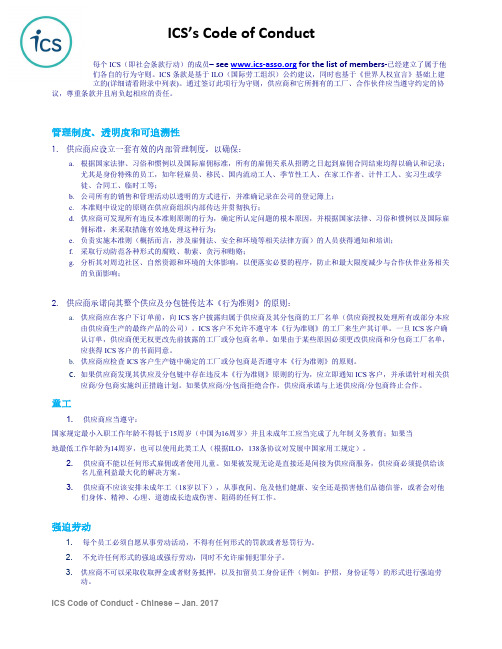
ICS’s Code of Conduct
每个 ICS(即社会条款行动)的成员– see for the list of members-已经建立了属于他
们各自的行为守则。ICS 条款是基于 ILO(国际劳工组织)公约建议,同时也基于《世界人权宣言》基础上建 立的(详细请看附录中列表)。通过签订此项行为守则,供应商和它所拥有的工厂、合作伙伴应当遵守约定的协 议,尊重条款并且肩负起相应的责任。
惩戒性措施、惩戒性措施、骚扰和虐待
1. 供应商应当关心和尊重所有员工。 2. 供应商不能参与或者纵容任何的恐吓、骚扰或者虐待。 3. 供应商应当建立纪律遵守标准,同时以清晰易懂的方式向其员工说明。并且对每一次的惩戒行为进行记录。
结社自由和投诉制度
1. 工人有权参加或者成立属于他们自己的工会以及进行集体谈判 ,期间供应商管理层不能被给予优先权。供应商不 得干扰、妨碍或阻止正当的活动。
2. 供应商不能以任何形式雇佣或者使用儿童。如果被发现无论是直接还是间接为供应商服务,供应商必须提供给该 名儿童利益最大化的解决方案。
3. 供应商不应该安排未成年工(18岁以下),从事夜间、危及他们健康、安全还是损害他们品德信誉,或者会对他 们身体、精神、心理、道德成长造成伤害、阻碍的任何工作。
Code of conduct (Chinese)-行为守 守则

本守厂。
本守的规1,2935,91.关根据联合2.强各制3.工制造卫生装置另外威胁4.结制造惩罚5.关制造仰、6.惩制造守则关于社会守则基于联合规定;同时,,75,81,87,980,111,143,14关于童工据国际劳工组合国儿童权利强迫和强制劳制造商或工厂工作场所的健造商或工厂必生条件等)的置向所有工人外,在牛仔制胁。
结社自由造商或工厂应罚作为结果。
关于歧视造商或工厂不残疾、性别惩戒措施,骚造商或工厂禁 会责任、人权合国全球契约国际劳工组8,100,105,1146,164,168,1组织的规定,利公约。
劳动厂不得以任何健康与安全必须保证提供的工作环境,人开放。
制造商的情况应该尊重工人不能在生产和别、年龄、性骚扰以及虐禁止对工人使权以及环境的约的原则与理组织的协议与1,122,131,13184及190条制造商或工何方式强迫和全供员工安全(同时要符合况中,要确保人加入、组织和雇员时,因性取向、政治虐待使用体罚、口行为守的条款,适用理念,结合了与建议也包括35,138,154,1条) 工厂禁止使用和强制工人劳(灭火器,机合相关立法方保旧技术的喷织和集体谈判因以下任何一治性结社、亲口头、心理及守则 用于所有MA 了世界人权宣括其中。
(协155,159,177,用童工。
关于劳动。
机械装置等)方面的要求。
喷砂及压砂的判的权利,并一种原因歧视亲缘关系等。
及身体等任何ANGO 成衣及宣言以及联合协议第182及183条于未成年工,与健康(灯制造商或工的使用不会对并且不会因此视员工:种族何方式的虐待EF ‐RSC ‐0G ‐00Page 1 de 3及饰品制造商合国儿童权利条;建议第我们的政策灯光,通风设工厂也要保证对工人的健康此遭受任何形族、国籍、宗待。
05/1商及工利公约策基于设备,证这些康产生形式的宗教信7.工制造当补8.薪制造定的9.分制造10.关所有MAN 11.顺制造联系工作时数 造商或工厂必补偿。
Codeconductpdf
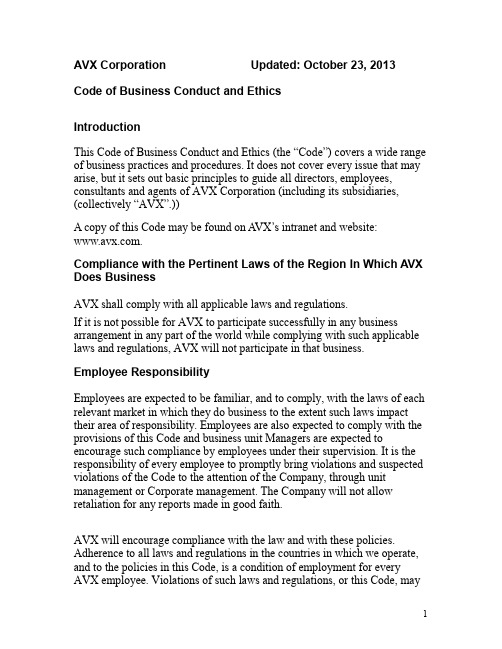
AVX Corporation Updated: October 23, 2013Code of Business Conduct and EthicsIntroductionThis Code of Business Conduct and Ethics (the “Code”) covers a wide range of business practices and procedures. It does not cover every issue that may arise, but it sets out basic principles to guide all directors, employees, consultants and agents of AVX Corporation (including its subsidiaries, (collectively “AVX”.))A copy of this Code may be found on A VX’s intranet and website:.Compliance with the Pertinent Laws of the Region In Which AVX Does BusinessAVX shall comply with all applicable laws and regulations.If it is not possible for AVX to participate successfully in any business arrangement in any part of the world while complying with such applicable laws and regulations, AVX will not participate in that business. Employee ResponsibilityEmployees are expected to be familiar, and to comply, with the laws of each relevant market in which they do business to the extent such laws impact their area of responsibility. Employees are also expected to comply with the provisions of this Code and business unit Managers are expected to encourage such compliance by employees under their supervision. It is the responsibility of every employee to promptly bring violations and suspected violations of the Code to the attention of the Company, through unit management or Corporate management. The Company will not allow retaliation for any reports made in good faith.AVX will encourage compliance with the law and with these policies. Adherence to all laws and regulations in the countries in which we operate, and to the policies in this Code, is a condition of employment for every AVX employee. Violations of such laws and regulations, or this Code, mayexpose the employee and AVX to civil and criminal liability and could harm the Company’s reputation and competitive position. Violations will be dealt with promptly and may result in disciplinary measures up to and including the termination of employment.Although the Code provides a framework to guide business conduct, it does not cover every situation. Please contact the Vice President of Business and Legal Affairs if you need assistance in understanding or interpreting the Code.Shareholders’ AssetsA VX is dedicated to creating value for its shareholders. AVX’s shareholders have shown confidence in the company by investing in AVX. Everyone at AVX is obligated to enhance and protect AVX’s assets and ensure their efficient use. That means each employee must vigilantly protect AVX’s physical property, as well as intangible, intellectual and other proprietary property or information, including trade secrets. In addition, each employee must use AVX’s assets for only legitimate business purposes.Improper PaymentsNo bribes, kickbacks, or other payments shall be made to or for the benefit of government employees or officials, customers, or others. No employee may solicit or accept personally or by or through family members, a business courtesy which might have the appearance or effect of influencing the employee’s judgment in the performance of his or her duties. This policy extends not only to direct payments, but also to indirect payments made in any form through consultants or third parties.Customer RelationshipsNo benefit will be given to a customer with an explicit or implicit requirement or expectation to use or purchase AVX products. “Customer” is used throughout these policies to mean any person or entity that is in a position to purchase or influence a decision to purchase AVX products (“Products”).Certain discounts, volume rebates, free samples, and returns of products furnished in the ordinary course of business are permitted, provided such benefits comply with AVX’s policies.Donations to customers or organizations closely affiliated with customers shall entail a benefit to society and may be made to promote good corporate citizenship, or serve a genuine educational function.The giving of gifts is generally prohibited. An exception is made in some countries for gifts to non-governmental officials which are modest in amount, recognized as a custom of the trade, and which could in no way cause AVX to be embarrassed or obligated. All business courtesies such as meals, transportation, and entertainment provided to a customer must be modest in amount and be related to a legitimate business purpose.Record keepingAVX units will maintain accurate Company records and accounts in order to comply with legal and ethical business practices and to avoid fraudulent activities. Controllers for AVX businesses, including subsidiaries worldwide, have the responsibility to express their independent views to, and raise any significant issues with, the Chief Financial Officer or the Chief Executive Officer.Records and accounts must be complete and not misleading. All Company accounting records, and the reports produced from those records, must be kept and presented in accordance with all applicable laws and relevant accounting standards.No undisclosed or unrecorded assets or liabilities of AVX may be maintained for any purpose. No false or artificial entries may be made in any accounts.AVX will maintain a system of internal accounting controls to ensure that assets are safeguarded and transactions conform to management’s authorizations, and accounting records are complete and kept in accordance with all applicable laws and relevant accounting standards. No information should be concealed from internal, or external, auditors.All employees have an obligation to accurately record time worked and accurately document business expenses incurred and complete timely expense reports.Antitrust/CompetitionAntitrust laws in the U.S. and competition laws outside the U.S. exist to ensure free and open competition in the marketplace, a principle that AVX fully supports. Violation of these laws can result in civil liability and criminal penalties for AVX and its employees.These laws are complex and, consequently, employees may not take any collaborative action with a competitor, or take any action that could have an improper anti-competitive effect. Examples of prohibited conduct include: -Agreements or understandings with competitors, either directly orthrough others, to fix prices, divide customers or territories, or restrict sales;-Exchange of pricing or other proprietary information withcompetitors; and-Illegal tying, illegal price discrimination or refusals to deal.AVX management is expected to maintain basic familiarity with the principles and purposes of the antitrust laws as they apply to AVX business, and to abstain from any activities that might violate or create any appearance of intention to violate such laws.Conflict Of InterestAVX employees owe a duty of undivided business loyalty to the Company. This duty is breached when an employee engages in activities that cause a conflict of interest or when an employee takes advantage of corporate opportunities by using Company assets or information for personal gain. Conflicts of interest may arise when employees are influenced by considerations of gain or benefit for themselves or their family members which conflic t with their obligation to serve AVX’s best interest. Anything that would be a conflict of interest for an employee may also be a conflict of interest if it involves a family member. Conflicts of interest can take many forms, not all of which can be addressed by this Code.The following are examples of potential conflicts of interest:-Consulting with or employment by a competitor, supplier, or customer of AVX;-Authorizing the use of any services by family members, or where family members may derive a benefit from providing such services;-Holding a substantial equity, debt, or other financial interest in anycompetitor, supplier, or customer;-Having a financial interest in any transaction involving the purchase or sale of any Products, other than through Company-sponsored programs;-Using employees, materials, equipment, or other assets of AVX for any unauthorized purpose; or-Accepting any cash, gifts, entertainment, or benefits that are more than modest in value from any competitor, supplier, or customer.Each employee is responsible for avoiding conflicts of interest as well as the appearance of such conflicts. Employees who are unsure whether they are involved in a conflict of interest or whether an action might create a conflict of interest should discuss the issue with their manager, the Vice President of Human Resources, or the Vice President of Business and Legal Affairs. Insider TradingAll AVX employees are prohibited from engaging in insider trading. Insider trading is trading in AVX stock while aware of confidential information about the Company that could, if it became public, affect the stock price. Disclosure of any information to another person, such as a spouse or friend, which would enable them to gain a trading benefit not available to the general public, is prohibited as well. This conduct is illegal and could subject the employee and AVX to civil liability and criminal penalties. Intellectual Property and Confidential InformationAVX and its customers invest substantial resources in developing proprietary intellectual property and confidential information. Confidential information is information that is not generally known or readily available to others. AVX protects its intellectual property by seeking patent, trademark, or trade secret protection. It protects customer and AVX confidential information by taking precautions to prevent inappropriate disclosure or loss of such information.Confidential information is critical to AVX’s competitive advantage. This includes technical know-how and data, trade secrets, business plans, marketing and sales programs, and sales figures, as well as information relating to mergers and acquisitions, stock splits, divestitures, licensing activities, and changes in senior management.Confidential information also includes personal information about AVX employees, such as salaries, benefits, and information contained in personnel files. Confidential information must not be shared with others outside AVX except pursuant to Corporate approval.QualityAVX is committed to producing quality Products. AVX will comply with all laws and regulations regarding the safety and efficacy of its Products and the standards for its manufacturing plants.Environmental ManagementAVX is committed to doing business in an environmentally responsible manner and will strive to improve its performance to benefit its employees, customers, communities, shareholders, and the environment. All employees are responsible for making sure that AVX’s business is conducted in compliance with all applicable environmental laws.Safety and HealthAVX is committed to a safe, healthy work environment that is in compliance with all applicable laws and regulations. All employees are expected to develop a pro-active, cooperative attitude toward issues of health and safety throughout the Company.Employees may not use, sell, possess, purchase or transfer alcohol or illegal drugs on AVX property.Productive Work EnvironmentAVX is committed to a productive work environment. Key elements for developing such an environment include freedom from harassment in any form, a culture that recognizes and appreciates the advantages of a diverse work force, and a decision process that seeks to ensure that all employees are treated with dignity and respect.Discrimination on the basis of race, religion, gender, color, ethnic or national origin, age, disability, sexual preference, or marital status will not be allowed. This includes discrimination in hiring, training, advancement, compensation, discipline, and termination. Harassment, such as racial orsexual harassment, will not be tolerated and should be reported to the appropriate manager or Human Resources Representative.Corporate Political ActivityAVX supports everyone’s right to participate actively in the political process. No one should, however, solicit contributions for any political party, political committee or candidate for public office during work hours or on AVX property. No corporate funds, or other corporate assets, may be contributed directly or indirectly to any political party, political committee, or candidate for public office.Government, Analyst, and Media InquiriesAVX senior management must be made aware of any inquiries from the government, the financial/analyst community, or the media so that it can properly and thoroughly respond. If an AVX employee is contacted by a representative of a governmental agency, the financial/analyst community, or the media seeking an interview, or making a non-routine request for documents, that employee should immediately contact local management or the Chief Financial Officer so that appropriate arrangements can be made. General Social PolicyAVX is committed to the highest principles of corporate citizenship. AVX has committed itself to achieve the objectives of the EICC Code of Conduct, SA8000, and to the exclusive use of non-conflict minerals. AVX expects all of its suppliers to adhere to the same standards.。
供应商行为准则(Code of Conduct for Suppliers) V01
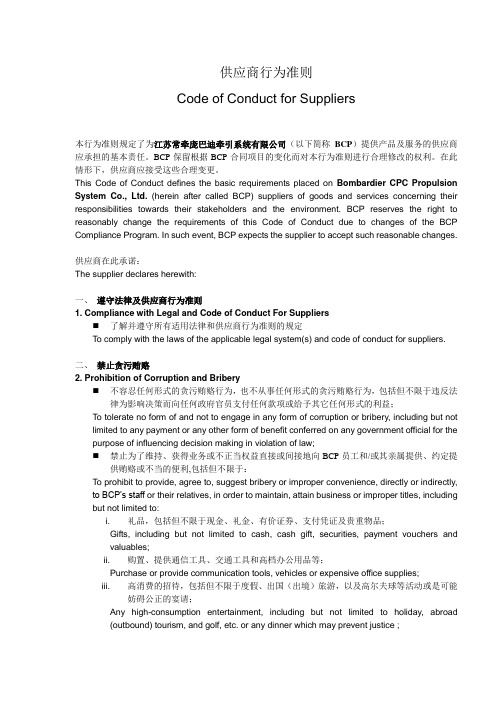
供应商行为准则Code of Conduct for Suppliers本行为准则规定了为江苏常牵庞巴迪牵引系统有限公司(以下简称BCP)提供产品及服务的供应商应承担的基本责任。
BCP保留根据BCP合同项目的变化而对本行为准则进行合理修改的权利。
在此情形下,供应商应接受这些合理变更。
This Code of Conduct defines the basic requirements placed on Bombardier CPC Propulsion System Co., Ltd. (herein after called BCP) suppliers of goods and services concerning their responsibilities towards their stakeholders and the environment. BCP reserves the right to reasonably change the requirements of this Code of Conduct due to changes of the BCP Compliance Program. In such event, BCP expects the supplier to accept such reasonable changes.供应商在此承诺:The supplier declares herewith:一、遵守法律及供应商行为准则1. Compliance with Legal and Code of Conduct For Suppliers⏹了解并遵守所有适用法律和供应商行为准则的规定To comply with the laws of the applicable legal system(s) and code of conduct for suppliers.二、禁止贪污贿赂2. Prohibition of Corruption and Bribery⏹不容忍任何形式的贪污贿赂行为,也不从事任何形式的贪污贿赂行为,包括但不限于违反法律为影响决策而向任何政府官员支付任何款项或给予其它任何形式的利益;To tolerate no form of and not to engage in any form of corruption or bribery, including but not limited to any payment or any other form of benefit conferred on any government official for the purpose of influencing decision making in violation of law;⏹禁止为了维持、获得业务或不正当权益直接或间接地向BCP员工和/或其亲属提供、约定提供贿赂或不当的便利,包括但不限于:To prohibit to provide, agree to, suggest bribery or improper convenience, directly or indirectly, to BCP’s staff or their relatives, in order to maintain, attain business or improper titles, including but not limited to:i. 礼品,包括但不限于现金、礼金、有价证券、支付凭证及贵重物品;Gifts, including but not limited to cash, cash gift, securities, payment vouchers and valuables;ii. 购置、提供通信工具、交通工具和高档办公用品等;Purchase or provide communication tools, vehicles or expensive office supplies;iii. 高消费的招待,包括但不限于度假、出国(出境)旅游,以及高尔夫球等活动或是可能妨碍公正的宴请;Any high-consumption entertainment, including but not limited to holiday, abroad (outbound) tourism, and golf, etc. or any dinner which may prevent justice ;iv. 安排工作,或支付应由自己或其亲属自付的各种费用,包括但不限于住宅装修、婚丧嫁娶、购物、学费;Arrange work or pay any fee for himself or his relatives which shall be paid by his own, including but not limited to decoration fee, wedding and funerals fee, shopping expense, tuition fee;v. 成比例的,或者正相关的利益联系,例如股份、回扣等Proportional relationship or any other positive benefit-based relationship, e.g. share, discount, etc.三、禁止隐形代理3. Prohibition of Invisible Agency⏹任何第三方(因BCP与供应商之间的业务而成为关联分供应商的除外)不得因供应商与BCP的业务而从供应商处获得任何经济利益。
外置适配器能效自我宣告 Code of Conduct on Energy Efficiency of External Power Supplies Version 5
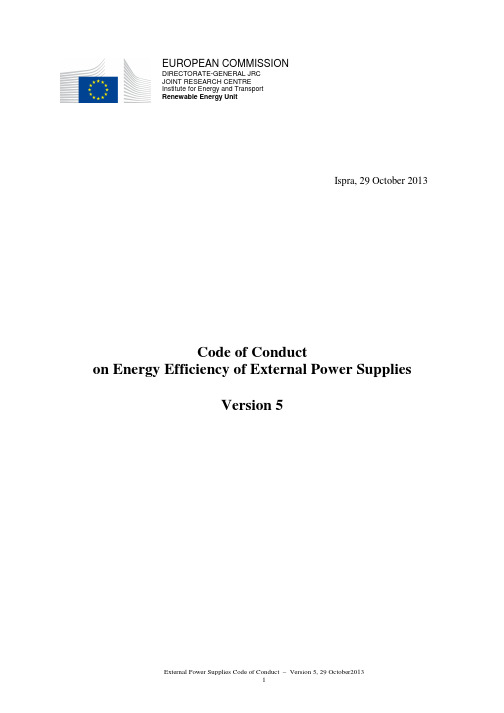
EUROPEAN COMMISSIONDIRECTORATE-GENERAL JRCJOINT RESEARCH CENTREInstitute for Energy and TransportRenewable Energy UnitIspra, 29 October 2013Code of Conducton Energy Efficiency of External Power SuppliesVersion 51.I NTRODUCTIONThis Code of Conduct has been prepared by the European Commission Joint Research Centre, following the discussions of the working group composed by independent experts, Member States representatives and representatives of industry.Power supplies contribute substantially to the electricity consumption of households in Europe. The impact assessment for the ecodesign regulation on external power supplies calculated an increase in energy consumption from about 7.3 TWh in 2010 to about 7.5 TWh in 2020 (Business as Usual scenario). With actions resulting from this Code of Conduct savings of 1.04 TWh in 2020 are achieved1.When addressing efficiency of power supplies, also power quality should be taken into account. Although applying electronics in power supplies can increase efficiency and lower no load losses, it should not adversely affect the power quality.2.S COPEScope of this Code of Conduct are single voltage external ac-dc and ac-ac power supplies for electronic and electrical appliances, including among others AC adapters, battery chargers for mobile phones, domestic appliances, power tools and IT equipment, in the output power range 0.3W to 250W. As the name implies, external power supplies are contained in a separate housing from the end-use devices they are powering; internal power supplies (those contained inside the product) are not covered by this Code of Conduct. In most cases power supplies are specified by the appliance manufacturer; production can be at the appliance manufacturer or at a dedicated manufacturer.As a separate subcategory a Low Voltage external power supply is defined as an external power supply that satisfies both of the following criteria:• a nameplate output voltage of less than 6 volts and• a nameplate output current greater than or equal to 550 milliamps.This Code of Conduct does not cover the following types of external power supplies:•dc-dc power supplies,•ac adapters with more than one output terminal using switching power circuit, •contact-less chargers using switching power circuit.1 CLASP, Estimating potential additional energy savings from upcoming revisions to existing regulations underthe ecodesign and energy labelling directives, 18 February 2013, pp. 18-203.A IMTo minimise energy consumption of external power supplies both under no-load and load conditions in the output power range 0.3W to 250W.4.C OMMITMENTSignatories of this Code of Conduct commit themselves to:4.1 Design power supplies or component so as to minimise energy consumption of externalpower supplies. Those companies who are not responsible for the production of power supplies shall include the concept of minimisation of energy consumption in their purchasing procedures of power supplies.4.2 Achieve both the no-load power consumption and on-mode efficiency targets shown inTable 1.1, Table 2.1 and 2.2 for at least 90% of products2, for the new models of external power supplies that are introduced on the market or specified in a tender/procurement after the effective date (for new participants after the date they have signed the Code of conduct).Table 1.1: No-load Power ConsumptionRated Output Power (P no)No-load power consumption Tier 1 Tier 2> 0.3 W and < 49 W 0.150 W 0.075 W> 49 W and < 250 W 0.250 W 0.150 W Mobile handheld battery drivenand < 8 W0.075 W 0.075 WTable 2.1: Energy-Efficiency Criteria for Active Mode (excluding Low Voltage external power supplies)Rated Output Power (P no) Minimum Four Point Average Efficiency inActive ModeMinimum Efficiency in Active Mode at 10 %load of full rated output current Tier 1 Tier 2 Tier 1 Tier 20.3 < W < 1 ≥ 0.500 * P no + 0.146 ≥ 0.500 * P no + 0.169 ≥ 0.500 * P no + 0.046 ≥ 0.500 * P no + 0.0601 < W < 49 ≥0.0626*ln(P no) + 0.646 ≥0.071*ln(P no)– 0.00115 * P no + 0.670 ≥0.0626*ln(P no) + 0.546 ≥0.071*ln(P no)– 0.00115 * P no + 0.57049 < W < 250 ≥ 0.890 ≥ 0.890 ≥ 0.790 ≥ 0.790“ln” refers to the natural logarithm. Efficiencies to be expressed in decimal form: an efficiency of 0.88 in decimal form corresponds to the more familiar value of 88% when expressed as a percentage.2The external power supplies not meeting the Code of Conduct specifications, shall not in any case exceed 10 % of the total sales volume for all models (falling in the scope of the Code of Conduct) produced or purchased by a participating company.Table 2.2: Energy-Efficiency Criteria for Active Mode for Low Voltage external power suppliesRated Output Power (P no) Minimum Four Point Average Efficiency inActive ModeMinimum Efficiency in Active Mode at 10 %load of full rated output current Tier 1 Tier 2 Tier 1 Tier 20.3 < W < 1 ≥ 0.500 * P no + 0.086 ≥ 0.517 * P no + 0.091 ≥ 0.500 * P no≥ 0.517 * P no1 < W < 49 ≥0.0755*ln(P no) + 0.586 ≥0.0834*ln(P no)– 0.0011 * P no + 0.609 ≥0.072*ln(P no) + 0.500 ≥0.0834*ln(P no)– 0.00127 * P no + 0.51849 < W < 250 ≥ 0.880 ≥ 0.880 ≥ 0.780 ≥ 0.780“ln” refers to the natural logarithm. Efficiencies to be expressed in decimal form: an efficiency of 0.88 in decimal form corresponds to the more familiar value of 88% when expressed as a percentage.The no-load power consumption and the energy efficiency shall be measured and declared according to the method in the Annex.Effective dates:Tier 1: 1 January 2014Tier 2: 1 January 20164.3 Co-operate with the European Commission and Member States in monitoring theeffectiveness of the Code of Conduct for external power supplies.5.M ONITORINGSignatories will report on a yearly basis in a confidential manner to the European Commission how many models of external power supplies out of the total number of models a manufacturer produces reach the target in that year. For each model using an external power supply or each external power supply the associated no-load power consumption and the efficiency values as specified in the Annex shall be reported by means of an electronic spreadsheet that will be provided by the European Commission. The reporting shall be completed by the end of February of the following year. The monitoring results will be discussed in an anonymous manner with parties involved and can be published by the European Commission.AnnexM EASUREMENT METHODMeasurements should be carried out according to the method specified in the “Test Method for Calculating the Energy Efficiency of Single Voltage External Ac-Dc and Ac-Ac Power Supplies (August 13, 2004)”, issued by US EPA.The following measurement results should be reported:-no-load power consumption-efficiency at 10 %, 25 %, 50 %, 75 % and 100 % of full rated output currentCode of Conducton Efficiency of External Power SuppliesSIGNING FORMThe organisation/company/ ………………………………………………………………..signs the Code of Conduct on Efficiency of External Power Supplies and commits itself to abide to the principles described in point 4 “The Commitment” for the following product categories: ……………….………………….The organisation, through regular upgrade reports, will keep the European Commission informed on the implementation of the Code of Conduct on Efficiency of External Power Supplies.for the organisationDirector or person authorised to sign:Name: ………………………………Managerial Function: ………………………………Address ………………………………………………Tel. / Fax. ………………………/ …………….………Signature ………………………………….Please send the signed form to :Paolo BertoldiEuropean Commission, Joint Research CentreTP 450I-21020 Ispra (VA)Tel. +39 0332 789299Fax. +39 0332 789992E-mail: paolo.bertoldi@ec.europa.eu。
HR006-Code of Conduct_行为准则

人力资源政策授权人:Subject: Code of Conduct 标题:行为准则Revision Date:2009-01-01 更新日期:Section No: HCN-IDM-HR006-8.0 文档号:HCN-IDM-HR006-8.0Page 1 of 6第1 页,共 6 页Replaces Issue Dated:2007-11-20改版发布日期:1.POLICY政策It is the Hagemeyer China’s policy to demonstrate the highest level of integrity andethical standards in all business practices. To this end, Employees are required toconduct themselves in a manner consistent with Company standards, communitystandards and legislative requirements.本政策为海格曼中国展示其在商业活动中高度诚信和道德标准的政策。
为此目的,员工需要使自己的行为符合公司标准团体标准以及法规的要求。
2. DEFINITIONS定义Code of Conduct行为准则Outlines how Employees should behave and conduct business in the workplace on arange of issues.概述员工在工作场所就一系列问题应如何行为处事及开展业务。
Exclusions排除事项The Code of Conduct does no t include:行为准则不包括:•Every ethical issue that an Employee might face; and员工可能会面临的每个道德问题,以及;•Every law and policy that applies to the Company.适用于该公司的每部政策和程序。
Apple Supplier Code of Conduct (3.4)中英文对照
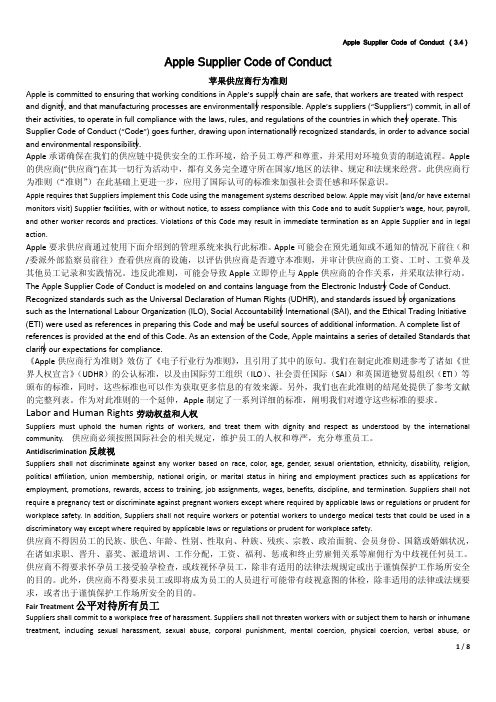
Apple Supplier Code of Conduct (3.4)Apple Supplier Code of Conduct苹果供应商行为准则Apple is committed to ensuring that working conditions in Apple’s supply chain are safe, that workers are treated with respect and dignity, and that manufacturing processes are environmentally responsible. Apple’s suppliers (“Suppliers”) commit, in all of their activities, to operate in full compliance with the laws, rules, and regulations of the countries in which they operate. This Supplier Code of Conduct (“Code”) goes further, drawing upon internationally recognized standards, in order to advance social and environmental responsibility.Apple承诺确保在我们的供应链中提供安全的工作环境,给予员工尊严和尊重,并采用对环境负责的制造流程。
Apple 的供应商(“供应商”)在其一切行为活动中,都有义务完全遵守所在国家/地区的法律、规定和法规来经营。
此供应商行为准则(“准则”)在此基础上更进一步,应用了国际认可的标准来加强社会责任感和环保意识。
Apple requires that Suppliers implement this Code using the management systems described below. Apple may visit (and/or have external monitors visit) Supplier facilities, with or without notice, to assess compliance with this Code and to audit Supplier’s wage, hour, payroll, and other worker records and practices. Violations of this Code may result in immediate termination as an Apple Supplier and in legal action.Apple要求供应商通过使用下面介绍到的管理系统来执行此标准。
code of conduct制度
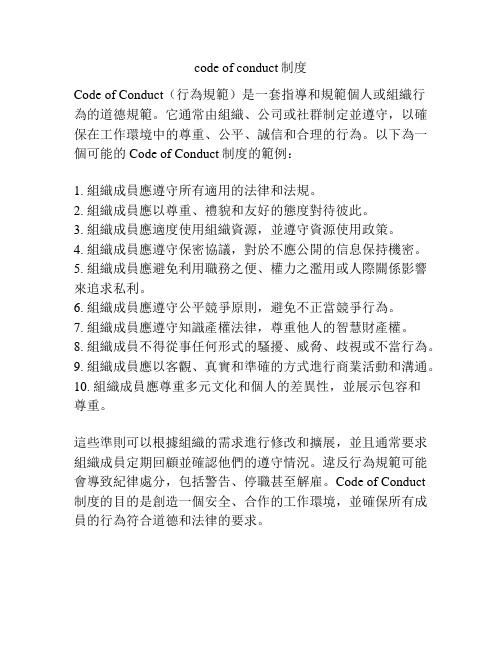
code of conduct制度
Code of Conduct(行為規範)是一套指導和規範個人或組織行
為的道德規範。
它通常由組織、公司或社群制定並遵守,以確保在工作環境中的尊重、公平、誠信和合理的行為。
以下為一個可能的Code of Conduct制度的範例:
1. 組織成員應遵守所有適用的法律和法規。
2. 組織成員應以尊重、禮貌和友好的態度對待彼此。
3. 組織成員應適度使用組織資源,並遵守資源使用政策。
4. 組織成員應遵守保密協議,對於不應公開的信息保持機密。
5. 組織成員應避免利用職務之便、權力之濫用或人際關係影響來追求私利。
6. 組織成員應遵守公平競爭原則,避免不正當競爭行為。
7. 組織成員應遵守知識產權法律,尊重他人的智慧財產權。
8. 組織成員不得從事任何形式的騷擾、威脅、歧視或不當行為。
9. 組織成員應以客觀、真實和準確的方式進行商業活動和溝通。
10. 組織成員應尊重多元文化和個人的差異性,並展示包容和
尊重。
這些準則可以根據組織的需求進行修改和擴展,並且通常要求組織成員定期回顧並確認他們的遵守情況。
違反行為規範可能會導致紀律處分,包括警告、停職甚至解雇。
Code of Conduct
制度的目的是創造一個安全、合作的工作環境,並確保所有成員的行為符合道德和法律的要求。
商业行为道德规范准则-“Code of Conduct” 遵守国内外的 - zwissTEX

商业行为道德规范准则 -“Code of Conduct”所有员工(以及管理层成员)均受本“Code of Conduct”规定的约束。
行为准则中阐述的价值观˴原则和行为方式,指导决定着Dr. Zwissler-企业集团以及其子属企业的商业行为。
企业管理的目标是遵守道德准则和创造一种促进诚信˴尊重和公平行为的工作环境。
严格遵守法律和原则的商业政策符合企业的长远利益。
这份行为准则“Code of Conduct” 由Dr. Zwissler Holding AG董事会决定并经监事会批准,适用于所有Dr. Zwissler-企业集团的旗下企业(后面简称为“企业”)。
遵守国内外的法律法规在所有业务决策和行动中,本企业努力遵守有效的法律及其他国内和国际相关法规。
诚信和诚意促进公平竞争,这也适用于对我们的客户和供应商的关系中。
对员工和同事间的行为规则每个员工都有权得到公平的待遇˴礼貌和尊重。
在企业的任何地点都不容忍歧视和骚扰。
特别是不容忍基于伦理文化˴残疾˴性别˴宗教信仰˴年龄或性取向基础上的歧视。
禁止童工˴强迫劳动和贩卖人口,这些行为无例外地将被拒绝和主动避免。
管理层的职责企业自我认知有义务在经济,社会和环境意识方面采取措施。
为此我们履行遵守所有企业所在基地的有效的环境保护条例。
在有效法规未达到能确保经济持续发展的保护水准的生产基地,企业将在经济合理的情况下,采取必要的措施达到适当的保护水准。
进一步来说企业会负责任地对待处理自然资源。
因此,本企业寻求以合乎情理的方式开展业务,遵守有效的反托拉斯˴竞争和竞争限制的法律,以保护其经营的所有市场的公平竞争。
消费者利益企业在其商业行为中考虑到消费者的利益。
企业确保其产品在使用时对健康安全无害.遵守法定限值并且尽可能的低于限值。
消费者的利益在新闻和销售活动中也将得到充分的考虑。
利益冲突我们期望员工对企业的忠诚。
所有员工必须避免个人或财务利益与企业利益相冲突的情况。
code_of_conduct_policy
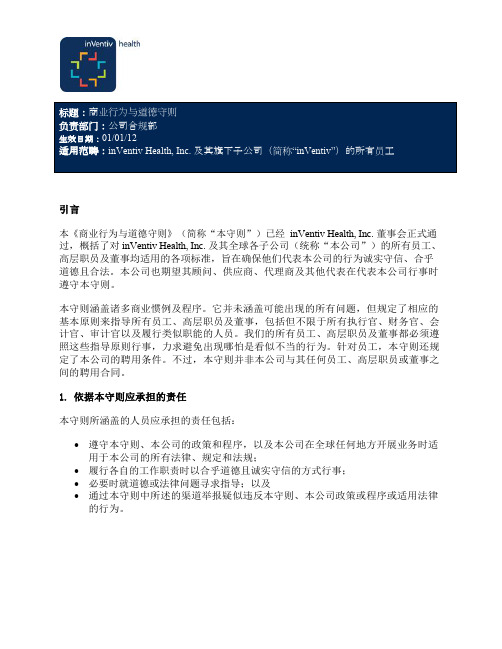
引言本《商业行为与道德守则》(简称“本守则”)已经inVentiv Health, Inc. 董事会正式通过,概括了对 inVentiv Health, Inc. 及其全球各子公司(统称“本公司”)的所有员工、高层职员及董事均适用的各项标准,旨在确保他们代表本公司的行为诚实守信、合乎道德且合法。
本公司也期望其顾问、供应商、代理商及其他代表在代表本公司行事时遵守本守则。
本守则涵盖诸多商业惯例及程序。
它并未涵盖可能出现的所有问题,但规定了相应的基本原则来指导所有员工、高层职员及董事,包括但不限于所有执行官、财务官、会计官、审计官以及履行类似职能的人员。
我们的所有员工、高层职员及董事都必须遵照这些指导原则行事,力求避免出现哪怕是看似不当的行为。
针对员工,本守则还规定了本公司的聘用条件。
不过,本守则并非本公司与其任何员工、高层职员或董事之间的聘用合同。
1.依据本守则应承担的责任本守则所涵盖的人员应承担的责任包括:∙遵守本守则、本公司的政策和程序,以及本公司在全球任何地方开展业务时适用于本公司的所有法律、规定和法规;∙履行各自的工作职责时以合乎道德且诚实守信的方式行事;∙必要时就道德或法律问题寻求指导;以及∙通过本守则中所述的渠道举报疑似违反本守则、本公司政策或程序或适用法律的行为。
2. 对法律、规定和法规的遵守本公司政策规定,其所有业务都须依照适用的法律、规定和法规开展。
无庸赘述,相对于营利或获得竞争优势的机会而言,遵守政府机关或监管机关的所有法律和法规更为优先。
如果某法律与本守则中的条款冲突,您必须遵守该法律;不过,如果当地风俗或政策与本守则冲突,您必须遵守本守则。
对于当地风俗或政策与本守则之间的任何差异,都应提请管理层注意。
如果您对与这些管治性义务有关的潜在冲突或者对法律或合规事宜存有任何疑问,您应设法通过本守则中所述的渠道解决它们。
任何员工、高层职员或董事若发觉违反或疑似违反适用法律的行为,应立即通过其中一种渠道加以举报。
BSCI code of conduct 行为守则

BSCI code of conduct 行为守则1.倡议商界遵守社会责任组织(BSCI)成员由零售公司及协会、进口商和生产公司组成,是欧洲社会一个针对遵守社会责任的普遍监控体系,旨在不断改进成员设在全球各地的生产及供应设施的社会责任表现。
BSCI监控体系无意取代其它已建立的外在多个利益方的确认体系。
2.BSCI成员认为需要为全球在其名下的所有活动负责。
他们特别感到有责任去为生产其产品的员工提供良好的工作条件。
BSCI成员也认为这一责任应延伸到所有为BSCI成员生产的员工,不论其是由BSCI 成员直接雇佣的员工,还是由第三方分包商和供应商雇佣的员工。
3.为了形成具有一定影响的和促成社会可接受的生产条件,BSCI成员制定此《行为守则》。
BSCI成员在全球的所有供应商也有义务遵守这一《行为守则》。
BSCI成员应以积极和合作的精神贯彻实施该《行为守则》。
他们乐意在维持所有现有商业关系的同时,完全遵守守则。
BSCI计划在不久将来提高对这个问题的意识,并在未来几年内达致连续和可持续的改进。
遵守社会责任方面的改进将使供应商有能力满足现有和未来市场的需求以及法律要求。
供应商在社会责任上的表现能够随着时日有系统地改进,并能避免遭受抵制的危机。
BSCI的立场是,只有在基本生活标准得到维持和改进的情况下,经济才可持续发展,社会才可进步。
4.《行为守则》只说明最低标准,不应将该守则理解为最大限度,也不应以任何方式用它来对雇员不利,例如,用于限制员工结社自由或集体谈判的权利。
5.BSCI成员认为本身与供应商是以伙伴关系的方式合作。
而落实社会可接受的生产条件是建立于对话、共识、合作和公平的原则等基础之上的。
受变化影响最大的相关方的利益应置于任何考虑和变化的显着位置。
《行为守则》的落实和执行取决于各自供应商及其经营所在国家的发展状况。
BSCI的最终目标是完全落实该守则。
6.供应商必须确保代表BSCI成员直到最后生产阶段的生产过程(例如调制和装配活动)涉及的所有分包商都遵守《行为守则》。
Vendor Code of Conduct Chinese
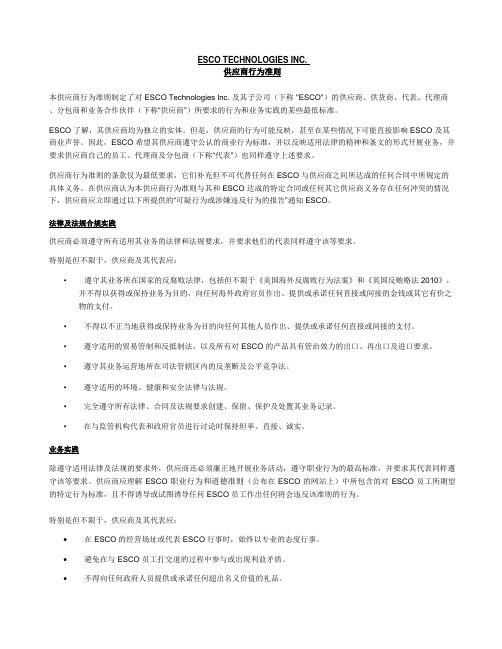
ESCO TECHNOLOGIES INC.供应商行为准则本供应商行为准则制定了对 ESCO Technologies lnc. 及其子公司(下称 "ESCO")的供应商、供货商、代表、代理商、分包商和业务合作伙伴(下称“供应商”)所要求的行为和业务实践的某些最低标准。
ESCO 了解,其供应商均为独立的实体。
但是,供应商的行为可能反映,甚至在某些情况下可能直接影响 ESCO 及其商业声誉。
因此,ESCO 希望其供应商遵守公认的商业行为标准,并以反映适用法律的精神和条文的形式开展业务,并要求供应商自己的员工、代理商及分包商(下称“代表”)也同样遵守上述要求。
供应商行为准则的条款仅为最低要求,它们补充但不可代替任何在 ESCO 与供应商之间所达成的任何合同中所规定的具体义务。
在供应商认为本供应商行为准则与其和 ESCO 达成的特定合同或任何其它供应商义务存在任何冲突的情况下,供应商应立即通过以下所提供的“可疑行为或涉嫌违反行为的报告”通知 ESCO。
法律及法规合规实践供应商必须遵守所有适用其业务的法律和法规要求,并要求他们的代表同样遵守该等要求。
特别是但不限于,供应商及其代表应:• 遵守其业务所在国家的反腐败法律,包括但不限于《美国海外反腐败行为法案》和《英国反贿赂法 2010》,并不得以获得或保持业务为目的,向任何海外政府官员作出、提供或承诺任何直接或间接的金钱或其它有价之物的支付。
• 不得以不正当地获得或保持业务为目的向任何其他人员作出、提供或承诺任何直接或间接的支付。
• 遵守适用的贸易管制和反抵制法,以及所有对 ESCO 的产品具有管治效力的出口、再出口及进口要求。
• 遵守其业务运营地所在司法管辖区内的反垄断及公平竞争法。
• 遵守适用的环境、健康和安全法律与法规。
• 完全遵守所有法律、合同及法规要求创建、保留、保护及处置其业务记录。
• 在与监管机构代表和政府官员进行讨论时保持坦率、直接、诚实。
行为守则(CODEOFCONDUCT)FESTO集团企业前言作为活跃在全球

行为守则(CODE OF CONDUCT)FESTO 集团企业前言作为活跃在全球并具有悠久传统的家族企业,Festo集团不仅注重诚信,还十分推崇符合道德和法律规范的行为,并在业务伙伴和员工中享有极高的声誉。
秉着现有的行为守则,我们恪守对商业和社会环境以及对全球员工的职责。
1. 目标和适用范围企业管理层所有成员及 Festo集团所有员工应熟知现有行为守则,并了解何种行为受法律和道德的约束,从而满足 Festo集团对符合道德和法律规范的诚信行为的高要求。
此外,该守则还应向 Festo 集团员工和其他团体表明,Festo集团将符合法律和道德规范的诚信行为置于首位。
即使在对个人或企业造成不便或在经济效益上造成损失、或与管理人员的指示有所冲突的情况下,仍遵守有效的法律规范并重视法律禁令或义务,这样的企业管理层成员和所有员工就显示出以企业利益为己任。
本行为守则适用于 Festo 集团的所有厂区。
若所在国具有比本行为守则更加严格的标准规范,则适用当地的严格法律规定。
本行为守则包含重要的行为准则,企业管理层,特别是法定代表人和管理人员以及下属员工均有义务遵守这些准则。
第三方不可以本行为守则为理由要求权利。
须强制遵守本行为守则中描述的行为方式。
这样便可提升 Festo的形象,同时还有益于确保企业长久的成功。
任何违反行为守则的行为,以及违反行为守则的要求都将不予容忍,同时还会采取适当的惩戒措施(不受法定制裁的影响)。
2. 合规官Festo集团董事会在监事会的批准下任命一位合规官,由其直接向董事会进行汇报。
合规官的工作是对行为守则的落实与实施进行监督,在实施行为守则的过程中为 Festo集团的各个公司提供支持,参与行为守则方针的拟定和修订工作,并作为任何与落实行为守则有关问题的责任人。
实施集团内审时,应确保审核过程中遵守该行为守则,并向合规官报告已确认的违反行为。
3. 商业环境中的行为3.1 遵守法律、内部准则和规定Festo集团所有厂区应遵守各自的有效法律规定、工业最低标准、联合国协议、国际劳工组织(ILO)协议、所有内部准则和规定以及所有其他相关规定(以下统称为“标准”)。
金曜日系辅助业务有关管理规定说明书

GOLDMAN SACHS DO BRASIL CORRETORA DE TÍTULOS E VALORES MOBILIÁRIOS S.A.Goldman Sachs Brazil OmbudsmanOPERATING RULES AND STANDARDSGoldman Sachs do Brasil Corretora de Títulos e Valores Mobiliários S.A. (the “Broker-Dealer ”), in due compliance with CVM Instruction no. 505/11 and other rules and procedures issued by BM&FBovespa, defines hereby its operating rules and standards regarding the receipt, registration, refusal, validity period, priority, execution, distribution and cancellation of trade orders received from its clients (“Clients ”) and the procedures related to settlement of trades and securities custody.Any modification in the Operating Rules and Standards will be formally and immediately communicated to all Clients of the Broker-Dealer, in writing by letter or e-mail, to the address indicated in their Registration Forms, without prejudice to the publication on the Broker-Dealer website.1. PRINCIPLESThe Broker Dealer is committed to the highest ethical standards in the conduct of its business, among which we highlight:(i) Fairness in the conduct of activities;(ii) Diligence for the integrity of the market, including with regard to the selection of clients and the requirements and deposit guarantees;(iii) Training for the performance of their activities;(iv) Due diligence in fulfilling orders and specification of principals;(v) Obtain and present to their clients the required information to fulfill orders;(vii) Adopt measures to avoid conducting operations in a conflict of interest and to ensure the fair treatment of their clients, and(ix) Supply their clients in a timely manner with the trade`s documentation.The Code of Conduct and Ethics ("Code of Business Conduct and Ethics"), along with the Principles of Business ("Business Principles") express the behavior expected of all employees of Goldman Sachs. The Code of Business Conduct and Ethics is available in the following link./investor-relations/corporate-governance/corporate-governance-documents/revise-code-of-conduct.pdf2. REGISTRATIONBefore a Client starts trading with the Broker-Dealer, it shall provide all the requested identification information by filling in and signing the Registration Form, and delivering copies of the documents supporting the information therein.The Client shall keep the registration information duly updated and shall inform the Broker Dealer of any changes to such information within five (5) days.3. RULES REGARDING THE RECEIPT OF ORDERSFor the purposes hereof and of CVM Instruction no. 505/11, “Order” shall mean the act by which the Client requests that this Broker-Dealer buy or sell securities or register trades on its behalf and under the conditions that the Client specifies.3.1. Types of Accepted OrdersThe Broker-Dealer shall accept for execution the types of orders specified below, provided that the Client meets the other conditions set forth herein:a) Market Order –is an order that only specifies the quantity and characteristics of theassets or rights to be bought or sold, to be executed from the moment it is received.b) Limit Order –is an order to be executed at a price equal to, or better than, the pricespecified by the Client.c) Linked Order - is an order whose execution is linked to the execution of another orderfrom the Client, and may or may not have a price limit.d) Managed Order – is an order that specifies the quantity and characteristics of the assetsor rights to be bought or sold only, and whose execution is left at the Broker-Dealer’s discretion.e) Discretionary Order - is an order given by an asset manager or by a person or entityrepresenting more than one Client, in which case such person or entity giving the order shall determine the conditions under which the order shall be executed. After its execution, the person or entity placing the order shall specify the names of the beneficiaries, quantity of assets or rights to be attributed to each of them and the respective price.f) Financing Order - is an order comprising a buy or sell order of an asset or right in amarket managed by BM&FBOVESPA, and another simultaneous sell or buy order of the same asset or right, in the same or in another market also managed by BM&FBOVESPA.g) Stop Order - is an order that specifies the price of the asset or right as of which theorder must be executed.2Goldman Sachs Brazil Ombudsmanh) Monitored Order – is an order that the Client, in real time, decides and determines to theBroker-Dealer the execution conditions;i) DMA Order –is an order that the Client sends directly to BM&FBOVESPA system,through a negotiation platform without passing through the Broker-Dealer trading desk. 3.2. The Broker-Dealer shall accept orders from its Clients for trades in the following markets: spot, forward, futures and options.3.3. Accepted Ways to Send OrdersThe orders shall be sent to the Broker-Dealer orally or written. In case the Client wishes to send such orders only in writing, they will only be accepted once they formally confirm this option in the Broker-Dealer registration form.Orders received in person or by telephone are considered oral orders. Orders received by electronic means, such as Bloomberg chat, or by any other means accepted by the Broker-Dealer by which it is possible to evidence their receipt, are considered written orders, provided that their authenticity and integrity are assured. Such written orders must contain, at least, the Client’s signature (or the signature of its attorney-in-fact) and the hour at which the message was sent and received. The orders received in person shall be registered in writing.Orders shall be received during business hours without time limitation. However, whenever they are not received during market hours, such orders shall be valid only for the next trading session.3.4. Order Refusal Procedures∙The Broker-Dealer may, at its sole discretion, refuse orders from its Clients, in whole or in part, such refusal to be promptly communicated to the Client, without the obligation to disclose the reasons for such refusal.∙The Broker-Dealer shall not execute orders from Clients that are, for any reason, prevented from trading in the securities market.∙The orders sent by the Client to the Broker-Dealer may, at the Broker-Dealer’s sole discretion, be executed by another institution with which the Broker-Dealer maintains an agreement for the performance of such services.∙The Broker-Dealer, at its sole discretion, may determine that the acceptance of the orders shall be contingent upon the compliance by the Client with the following requirements:j) prior deposit of the securities to be sold or, in case of purchase or movements that may create certain obligations, prior deposit of the amount corresponding to the trade;k) in case of offering of naked options, the Broker-Dealer shall accept orders upon the prior deposit of the underlying securities or guarantees with Companhia Brasileira de Liquidação e Custódia (the Brazilian Settlement and Custody Company) – CBLC, through3Goldman Sachs Brazil OmbudsmanGoldman Sachs Brazil Ombudsman4 the Broker-Dealer, provided that they are accepted as guarantee by CBLC also, or upon a cash deposit in the amount deemed necessary.∙ The Broker-Dealer shall establish, at its sole discretion, operational limits and/or mechanismsthat aim to limit risks to its Client(s), arising out of price variation and exceptional market conditions, and may refuse, in whole or in part, to execute the requested trades upon prompt communication to the Client(s).∙ In case the Client does not specify the type of order related to the trade that it wishes toexecute, the Broker-Dealer may choose the type of order that best meets the instructions received.3.5. Persons Authorized to Send OrdersThe Broker-Dealer shall accept Clients’ orders sent by third parties, provided that such third parties are duly authorized in the Registration Form or in the case of attorneys-in-fact, provided that they are duly identified and a copy of the relevant power-of-attorney is delivered to the Broker-Dealer. It is also the Client’s responsibility to inform the Broker -Dealer regarding any revocation of such power-of-attorney and the appointment of a new attorney-in-fact.4. RULES REGARDING THE ENTRY OF TRADE ORDERS4.1. Entry of OrdersThe Broker-Dealer shall enter the orders received in an information technology system, which shall assign a control number, issuance date and reception time to each order.The Broker-Dealer may adopt a recording system to control the orders received from Clients.4.2. Formal Entry (Control)The formal registration of the orders may include the following information:- Client’s identification code or account name at the Broker-Dealer;- Date, time and number that identifies the sequential and chronological numbering of theorder;- Asset that is the object of the order (characteristics, trading code, quantity and price of thesecurities to be traded);- Nature of the trade (buy or sell and type of market: spot, forward, options and futures, swapand fixed income, and when they are transactions on BM&F, passing on or transactions of Direct Settlement Participants (PLD));- Type of order (Managed, Linked, Discretionary, Limited Price, Market, Monitored (for BM&Ftransactions), Financing or Stop Order);- Identification of the issuer/transmitter of the order in the following cases: Clients that are legalentities, Clients whose portfolio is managed by third parties, or Clients on behalf of which a representative or attorney-in-fact is authorized to send orders;-Validity period of the order.-Identification of transactions of related parties or of own portfolio;-Identification of the transaction number in the BM&FBOVESPA;-Identification of the Trader (alfa code) and of theTrading Desk (name); and-Identification of the status of the received order (executed, non-executed or canceled).5. RULES REGARDING THE VALIDITY PERIOD OF TRADE ORDERSThe Broker-Dealer may accept trade orders that are valid only for the day on which they are sent. The Broker-Dealer may accept trade orders valid for the period determined by the Client when sending the order.The Broker-Dealer may accept trade orders for a determined period.The Broker-Dealer may accept trade orders valid indefinitely until they are canceled by the Clients.6. RULES REGARDING THE EXECUTION OF ORDERSThe execution of an order is the act by which the Broker-Dealer carries out the order issued/transmitted by the Client by the fulfillment of the order in the respective markets.6.1. ExecutionThe execution of trade orders in BM&FBOVESPA’s trading systems may be grouped by Broker-Dealer, by market type and securities.In case either the Broker-Dealer’s or BM&FBOVESPA’s trading system is interrupted due to operational reasons or force majeure, the trades shall be executed, if possible, through another trading system made available by BM&FBOVESPA.6.2. Brokerage FeeThe brokerage fee shall be negotiated with the Client upon the engagement of the services.6.3. Order execution confirmationWithin the appropriate time, in order to allow the adequate control by the Client, the Broker-Dealer shall confirm to the Client the execution of the trade orders and the conditions under which they were executed, orally or by any other means that allow the confirmation (evidence) that the message was sent and received. The Broker-Dealer shall also confirm the execution of the order by delivering to the Client a brokerage note or similar document.The Client shall receive, at the address provided in its Registration Form, the Aviso de Negociação de Ações(Securities Trading Notice) –ANA, issued by BM&FBOVESPA, which evidences the trades executed on its behalf.5Goldman Sachs Brazil Ombudsman7. RULES REGARDING THE TRADE ALLOCATIONAllocation is the act by which the Broker-Dealer allocates to its Clients, in whole or in part, the trades executed by the Broker-Dealer, in the various markets.The Broker-Dealer shall allocate trades executed on BM&FBOVESPA by type of market, by security and by round/odd lot.When allocating the trades executed to meet the orders received, the following criteria shall be complied with:I. only the orders that may be executed at the moment of implementation of a trade shallcompete in their allocation;II. orders sent by persons not related to the Broker-Dealer shall have priority over orders sent by related persons;III. managed orders, financing orders and linked orders shall have priority in the allocation of trades, since the trades were carried out exclusively to satisfy them;IV. in due observance of the foregoing criteria, the sequential number of receipt of the order shall define the priority of the orders issued by Clients of the same category, except for monitored orders, in whose execution the Client may interfere, by telephone.8. RULES REGARDING THE CANCELLATION OF ORDERSAny and all orders, provided that they have not yet been executed, may be cancelled:a) on the Client’s own initiative;b) on the Broker-Dealer’s initiative:-when the trade, or circumstances, and the available data evidence a risk of default by the Client;-when the order violates the operational rules of the securities market or other applicable law or regulation, in which case the Broker-Dealer shall communicate such fact to the Client.-for any other reason the Broker-Dealer deems appropriate under the circumstances in its sole discretion.The order shall be cancelled and, as the case may be, replaced with a new order when the Client decides to change the conditions of such registered but not yet executed order.When the order is sent in writing, the Broker-Dealer shall only accept the cancellation thereof if the respective communication is also in writing.The order can be changed when there is an operational error, provided that such change is made within the period established by BM & FBOVESPA.9. RULES REGARDING THE TRADE SETTLEMENT6Goldman Sachs Brazil OmbudsmanThe Broker-Dealer shall maintain, in the name of the Clients, accounts that may not be operated by checks, and whose purpose is the registration of the trades and of the debits and credits made on its behalf.The Client undertakes to pay to the Broker-Dealer, by any means available to it, the debits resulting from the execution of trades on its behalf, as well as expenses related to such trades.The funds sent by the Client to the Broker-Dealer, through banks, shall only be considered available for investment after confirmation, by the Broker-Dealer, of the effective availability thereof.In case there are pending debits in the Client’s name, the Broker-Dealer is authorized to settle, at a stock exchange or clearing and settlement houses, the contracts, rights and assets acquired on the Client’s behalf, as well as foreclose on assets and rights given as guarantee for its trades or held by the Broker-Dealer, and use the proceeds resulting from the sale thereof to pay the pending debits, regardless of any judicial or extra-judicial notification.10. SECURITIES CUSTODYBefore starting its trades, the Client shall adhere to the terms of the CBLC Assets Custody Service Agreement, signed by this Broker-Dealer, granting CBLC powers to, as a fiduciary owner, transfer to its name, at the issuing companies, the assets that are owned thereby.The services that are the object of the foregoing contract include the custody of assets, updating, receiving of dividends, bonuses, interest, yields, exercising of rights in general and other activities related to the Services of Custody of Assets.The proceeds resulting from the rights related to the securities deposited in custody shall be credited to the Client’s current account with the Broker-Dealer, and the assets received shall be deposited in its custody account with CBLC.The right of subscription of assets shall only be exercised by the Broker-Dealer upon the Client’s authorization and prior deposit of the respective amount.The Client shall receive, at the address provided to the Broker-Dealer, monthly statements issued by CBLC, including the list of assets deposited and other operations carried out in its name.The custody account, opened by the Broker-Dealer with CBLC, shall be operated exclusively by the Broker-Dealer.11. RECORDING SYSTEMThe telephone conversations between the Client and the Broker-Dealer or professionals thereof to address any matters related to the Client’s transactions may be recorded, and the content thereof may be used as evidence in the clarification of issues related to its account and trades. The Broker-Dealer will maintain such recordings for a minimum period of five (05) years.12. RELATED PERSONS7Goldman Sachs Brazil OmbudsmanRelated persons are:a) the Broker-Dealer’s own portfolio;b) Administrators, employees, traders and representatives of the Broker-Dealer, including independent agents, law clerks and trainees;c) Shareholders or quotaholders of the Broker-Dealer, individuals;d) Spouse or partner and underage children of the persons described in items “b” and “c” above;e) Exclusive Funds whose shares belong to the entities/persons described in items “a” to “d” above and that are managed by the Broker-Dealer itself;f) Any other type of “vehicle“ or structure that, under an economic point of view, represents a transaction involving the Broker-Dealer’s own portfolio or which is of the interest of any of the persons described in items “b” to “d” above;g) Affiliated financial institution, thus considered any financial institution that belongs to the economic group of the Broker-Dealer, that is, the group of companies connected by equity participation, by operational control characterized by common administration or management, or by virtue of agreement;h) Affiliated non-financial company, that is, any company belonging to the economic group of the Broker-Dealer, pursuant to the definition of economic group in item “g” above.i) Other professionals that maintain services agreement related directly to the intermediation and operational support.12.1. Procedures for Related PersonsThe Broker-Dealer may perform transactions for related persons.In the event the Broker-Dealer performs a transaction in which the Broker-Dealer or its related persons act as the counterparty, this information shall be pointed out in the respective brokerage note or similar document confirming the execution of the order to be delivered to the Client.The orders of persons which are not related to the Broker-Dealer shall have priority over the orders of related persons.Transactions that do not allow previous identification of their counterparties are not subject to previous authorization from the Client.13. RULES REGARDING THE UPDATE OF RULES AND PARAMETERSAny amendment in the Rules and Performance Parameters of the Broker will be communicated formally and immediately to all active clients, which will automatically be linked to the new rules, terms and operational conditions established by the Broker Dealer.The communication to active clients will be sent through e-mail according to the address held on their respective registration form and will be available for consultation on the website of the Broker Dealer.8Goldman Sachs Brazil Ombudsman。
ICS - Code of Conduct - Chinese - Jan. 2016 - V1

3. 4. 5. 6. 7.
根据国家法律或双方协议合同适用之处,供应商应当始终支付给所有员工加班工资。
健康和安全
在健康和安全这项条款中,供应商应当依照不同行业,针对具体环境、相关会产生的危害而做出进一步与健康和 安全所相适应的细则: 1. 2. 3. 4. 5. 6. 7.
供应商应当为员工提供安全和干净的生产厂房和宿舍,同时还应该建立清晰的制度以跟踪和管理职业健康和安 全。 供应商必须采取充分的措施去防止因为生产或生产相关活动而引发的健康事故和伤害。最大程度采取合理可行措 施来减少存在于工作环境中的安全健康隐患。如需要应当为工人配备适当有效的劳动保护用品。 供应商应当提供充足的医疗救助和用品。 供应商应当向所有员工提供干净的厕所和饮用水。如可能,还应为食物准备和储存提供干净器具。 供应商应当保证员工宿舍的干净和安全。 供应商应当向高级管理层代表分配关于保障员工健康和安全的工作职责。 供应商应当向员工和管理层进行定期的健康和安全知识培训,而且对于所有新入职或更换岗位的员工和管理层进
ICS Code of Conduct - Chinese - Oct 2015 – V2
ICS’s Code of Conduct
强迫劳动
1. 2. 3. 4. 5.
每个员工必须自愿从事劳动活动,不得有任何形式的罚款或者惩罚行为。 不允许任何形以采取收取押金或者财务抵押,以及扣留员工身份证件(例如:护照,身份证等)的形式进行强迫劳 动。 禁止负债劳工的出现。供应商不能以任何形式雇佣负债劳工或者鼓励他们以招聘费、罚金或其他方式来偿还负 债。 禁止契约劳工的出现。供应商应当接受并允许员工提出的合理辞职要求。除此之外,供应商还应当准许员工在交 班之后有权离开工厂。
根据ILO公约,供应商应当给予工人代表们有接触工厂的机会,从而能开展他们工人代表的职责。 供应商必须在执行层面尽一切努力维持或参与有效的信息反馈和投诉制度,以使其能够对个人和社区做 出回应。
Apple Supplier Code of Conduct V4.0中英语文对照
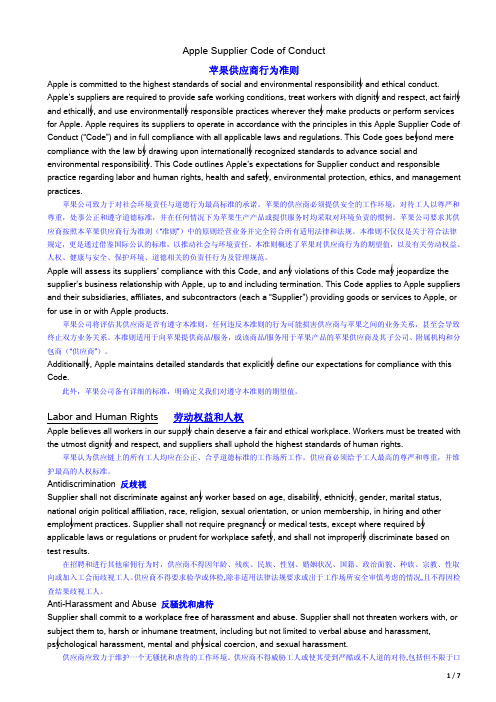
Apple Supplier Code of Conduct苹果供应商行为准则Apple is committed to the highest standards of social and environmental responsibility and ethical conduct. Apple’s suppliers are required to provide safe working conditions, treat workers with dignity and respect, act fairly and ethically, and use environmentally responsible practices wherever they make products or perform services for Apple. Apple requires its suppliers to operate in accordance with the principles in this Apple Supplier Code of Conduct (“Code”) and in full compliance with all applicable laws and regulations. This Code goes beyond mere compliance with the law by drawing upon internationally recognized standards to advance social and environmental responsibility. This Code outlines Apple’s expectations for Supplier conduct and responsible practice regarding labor and human rights, health and safety, environmental protection, ethics, and management practices.苹果公司致力于对社会环境责任与道德行为最高标准的承诺。
code_of_conductpdf
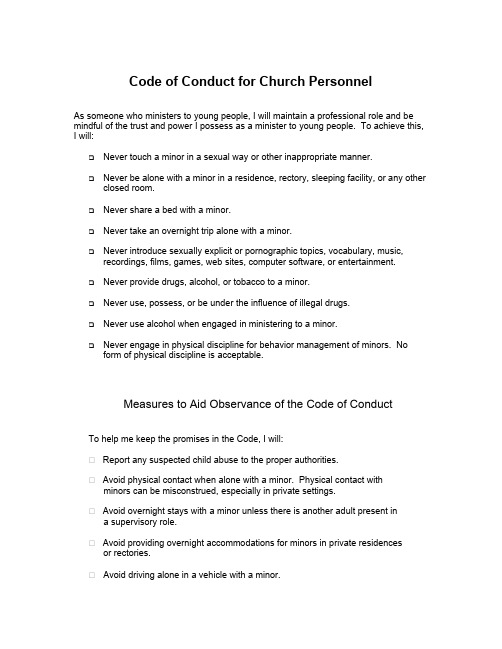
Code of Conduct for Church PersonnelAs someone who ministers to young people, I will maintain a professional role and be mindful of the trust and power I possess as a minister to young people. To achieve this, I will:Never touch a minor in a sexual way or other inappropriate manner.Never be alone with a minor in a residence, rectory, sleeping facility, or any other closed room.Never share a bed with a minor.Never take an overnight trip alone with a minor.Never introduce sexually explicit or pornographic topics, vocabulary, music, recordings, films, games, web sites, computer software, or entertainment.Never provide drugs, alcohol, or tobacco to a minor.Never use, possess, or be under the influence of illegal drugs.Never use alcohol when engaged in ministering to a minor.Never engage in physical discipline for behavior management of minors. No form of physical discipline is acceptable.Measures to Aid Observance of the Code of Conduct To help me keep the promises in the Code, I will:ڤ Report any suspected child abuse to the proper authorities.ڤ Avoid physical contact when alone with a minor. Physical contact withminors can be misconstrued, especially in private settings.ڤ Avoid overnight stays with a minor unless there is another adult present ina supervisory role.ڤ Avoid providing overnight accommodations for minors in private residencesorrectories.ڤAvoid driving alone in a vehicle with a minor.ڤRefrain from giving expensive or inappropriate gifts to a minor.ڤAvoid meeting privately with minors in rooms, offices, or similar areas where there is no window or where the door cannot remain open. If one-on-onepastoral care of a minor is needed (e.g., Sacrament of Reconciliation) avoidmeeting in isolated locations.ڤExercise caution in communicating with minors through e-mails or the internet.Only share work/ministry related e-mail addresses with minors. Do notparticipate in chat rooms with minors.ڤEnsure that all activities (extra-curricular, catechetical, youth ministry, scouting, athletics, etc.) for which you are responsible have been approved in advance by the appropriate administrator.ڤHave an adequate number of adults present at events. A minimum of two adults in supervisory roles must always be present during activities for minors.ڤRelease young people only to parents or guardians, unless the parent or guardian has provided permission allowing release to another adult.ڤAvoid taking minors away from the parish, school, or agency for field trips, etc.without another adult present in a supervisory role. Obtain written parentalpermission before such activities. Permission slips should include the type,locations, dates, and times of the activity and emergency contact numbers.Practical SuggestionsThese are some practical suggestions for identifying permissible and impermissible conduct.Conduct that May Be PermissibleAppropriate affection between Church personnel and minors constitutes a positive part of Church life and ministry. Nonetheless, any touching can be misunderstood and must be considered with great discretion. Depending on the circumstances, the following forms of affection are customarily (but not always) regarded as appropriate.▪ Verbal praise.▪Handshakes.▪ “High-fives” and hand slapping.▪ Pats on the shoulder or back.▪ Hugs.▪ Holding hands while walking with small children.▪ Sitting beside small children.▪Kneeling or bending down for hugs with small children.▪Holding hands during prayer.▪ Pats on the head when culturally appropriate.Conduct that is Not PermissibleSome forms of physical affection have been used by adults to initiate inappropriate contact with minors. In order to maintain the safest possible environment for minors, the following are examples of affection that are not to be used:▪ Inappropriate or lengthy embraces.▪ Kisses on the mouth.▪ Holding minors over four years old on the lap.▪ Touching buttocks, chests or genital areas.▪ Showing affection in isolated areas such as bedrooms, closets, staff-only areas or other private rooms.▪ Touching knees or legs of minors.▪ Wrestling with minors.▪ Tickling minors.▪ Piggyback rides.▪ Any type of massage given by minor to adult.▪ Any type of massage given by adult to minor.▪ Any form of unwanted affection.▪ Compliments that relate to physique or body development.Code of Conduct Acknowledgement FormEmployees and VolunteersParish/School/Agency _____________________________________Date ________________________________I have received a copy of the Code of Conduct for Church Personnel. I haveread and understand this Code of Conduct, and I agree to abide by it. I havealso read and understand the “Measures to Aid Observance of the Code of Conduct” and the “Practical Suggestions” and will employ them to help meobserve the code of conduct. A violation of this code can result in disciplinary action, up to and including termination and/or removal from ministry._______________________________________Signature_______________________________________Print Name_______________________________________PositionThe signed Code of Conduct Acknowledgement Form shall be kept in employee personnel files at the agency/parish/school or in a general volunteer file at the agency/parish/school.Please return this completed form to the site where you are an employee or volunteer.Code of Conduct Acknowledgement FormArchdiocesan, Religious and Extern PriestsParish/School/Agency __________________________________________ Date __________________________I have received a copy of the Code of Conduct for Church Personnel. Ihave read and understand this Code of Conduct, and I agree to abide by it. I have also read and understand the “Measures to Aid Observance of the Code of Conduct” and the “Practical Suggestions” and will employ them to help me observe the code of conduct. A violation of this code can result in disciplinary action, up to and including termination and/or removal from ministry.________________________________________Signature________________________________________Print Name_________________________________________________PositionڤArchdiocesanڤExternڤ Religious _____________________________________CommunityThe signed Code of Conduct Acknowledgement Form shall be kept in personnel files at the Pastoral Center. Please return the acknowledgement form to:PriestsReligious/ExternArchdiocesanPriestsOffice of the Chancellor Rev. Robert J. HeidenreichArchdiocese of Chicago Archdiocese of ChicagoP. O. Box 1979 P. O. Box 1979Chicago, IL 60690-1979 Chicago, IL 60690-1979Code of Conduct Acknowledgement FormDiaconate CommunityParish/School/Agency _____________________________________Date _____________________________I have received a copy of the Code of Conduct for Church Personnel. I have read and understand this Code of Conduct, and I agree to abide by it. I have also read and understand the “ Measures to Aid Observance of the Code of Conduct” and the “Practical Suggestions” and will employ them to help me observe the code of conduct. A violation of this code can result in disciplinary action, up to and including termination and/or removal from ministry.__________________________________________Signature__________________________________________Print Name__________________________________________PositionThe signed Code of Conduct Acknowledgement Form shall be kept in personnel files at the Diaconate Office. Please return the acknowledgement form to:Deacon Richard F. HudzikOffice of the Diaconate816 Marengo AvenueForest Park, IL. 60130。
4. Code of Conduct 中文版
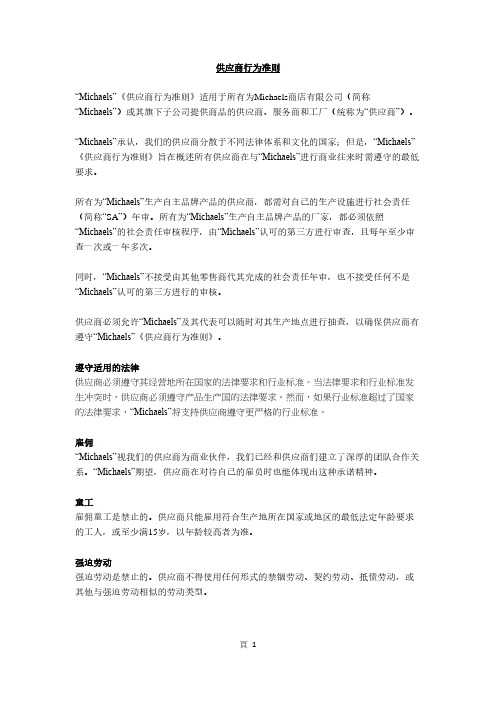
供应商行为准则“Michaels”《供应商行为准则》适用于所有为Michaels商店有限公司(简称“Michaels”)或其旗下子公司提供商品的供应商、服务商和工厂(统称为“供应商”)。
“Michaels”承认,我们的供应商分散于不同法律体系和文化的国家;但是,“Michaels”《供应商行为准则》旨在概述所有供应商在与“Michaels”进行商业往来时需遵守的最低要求。
所有为“Michaels”生产自主品牌产品的供应商,都需对自己的生产设施进行社会责任(简称“SA”)年审。
所有为“Michaels”生产自主品牌产品的厂家,都必须依照“Michaels”的社会责任审核程序,由“Michaels”认可的第三方进行审查,且每年至少审查一次或一年多次。
同时,“Michaels”不接受由其他零售商代其完成的社会责任年审,也不接受任何不是“Michaels”认可的第三方进行的审核。
供应商必须允许“Michaels”及其代表可以随时对其生产地点进行抽查,以确保供应商有遵守“Michaels”《供应商行为准则》。
遵守适用的法律供应商必须遵守其经营地所在国家的法律要求和行业标准。
当法律要求和行业标准发生冲突时,供应商必须遵守产品生产国的法律要求。
然而,如果行业标准超过了国家的法律要求,“Michaels”将支持供应商遵守更严格的行业标准。
雇佣“Michaels”视我们的供应商为商业伙伴,我们已经和供应商们建立了深厚的团队合作关系。
“Michaels”期望,供应商在对待自己的雇员时也能体现出这种承诺精神。
童工雇佣童工是禁止的。
供应商只能雇用符合生产地所在国家或地区的最低法定年龄要求的工人,或至少满15岁,以年龄较高者为准。
强迫劳动强迫劳动是禁止的。
供应商不得使用任何形式的禁锢劳动、契约劳动、抵债劳动,或其他与强迫劳动相似的劳动类型。
人权供应商必须确保每一位员工都应得到足够的尊重及尊严。
每一位员工都不得遭受任何身体、性、心理或言语上的骚扰或虐待。
- 1、下载文档前请自行甄别文档内容的完整性,平台不提供额外的编辑、内容补充、找答案等附加服务。
- 2、"仅部分预览"的文档,不可在线预览部分如存在完整性等问题,可反馈申请退款(可完整预览的文档不适用该条件!)。
- 3、如文档侵犯您的权益,请联系客服反馈,我们会尽快为您处理(人工客服工作时间:9:00-18:30)。
Code of Conduct for Members of the European Parliament with respect to financial interests and conflicts of interestArticle 1Guiding principlesIn exercising their duties, Members of the European Parliament:(a)are guided by and observe the following general principles of conduct:disinterest, integrity, openness, diligence, honesty, accountability andrespect for Parliament’s reputation,(b)act solely in the public interest and refrain from obtaining or seeking toobtain any direct or indirect financial benefit or other reward.Article 2Main duties of MembersIn exercising their duties, Members of the European Parliament shall:(a)not enter into any agreement to act or vote in the interest of any otherlegal or natural person that would compromise their voting freedom, asenshrined in Article 6 of the Act of 20 September 1976 concerning theelection of the members of the European Parliament by direct universalsuffrage and Article 2 of the Statute for Members of the EuropeanParliament,(b)not solicit, accept or receive any direct or indirect financial benefit orother reward in exchange for influencing, or voting on, legislation,motions for a resolution, written declarations or questions tabled inParliament or any of its committees, and shall consciously seek toavoid any situation which might imply bribery or corruption.Article 3Conflicts of interest1. A conflict of interest exists where a Member of the European Parliament has a personal interest that could improperly influence the performance of his or her duties as a Member. A conflict of interest does not exist where a Member benefits only as a member of the general public or of a broad class of persons.2.Any Member who finds that he or she has a conflict of interest shall immediately take the necessary steps to address it, in accordance with the principles and provisions of this Code of Conduct. If the Member is unable to resolve the conflict of interest, he or she shall report this to the President in writing. In cases of ambiguity, the Member may seek advice in confidence from the Advisory Committee on the Conduct of Members, established under Article 7.3.Without prejudice to paragraph 2, Members shall disclose, before speaking or voting in plenary or in one of Parliament’s bodies, or i f proposed as a rapporteur, any actual or potential conflict of interest in relation to the matter under consideration,where such conflict is not evident from the information declared pursuant to Article 4. Such disclosure shall be made in writing or orally to the chair during the parliamentary proceedings in question.Article 4Declaration by Members1.For reasons of transparency, Members of the European Parliament shall be personally responsible for submitting a declaration of financial interests to the President by the end of the first part-session after elections to the European Parliament (or within 30 days of taking up office with the Parliament in the course of a parliamentary term), in accordance with a form to be adopted by the Bureau pursuant to Article 9. They shall notify the President of any changes that have an influence on their declaration within 30 days of each change occurring.2.The declaration of financial interests shall contain the following information, which shall be provided in a precise manner:(a)the Member’s occupation(s) during the three-year period before he orshe took up office with the Parliament, and his or her membershipduring that period of any boards or committees of companies, non-governmental organisations, associations or other bodies established inlaw,(b)any salary which the Member receives for the exercise of a mandate inanother parliament,(c)any regular remunerated activity which the Member undertakesalongside the exercise of his or her office, whether as an employee oras a self-employed person,(d)membership of any boards or committees of any companies, non-governmental organisations, associations or other bodies established inlaw, or any other relevant outside activity that the Member undertakes,whether the membership or activity in question is remunerated orunremunerated,(e)any occasional remunerated outside activity (including writing,lecturing or the provision of expert advice), if the total remunerationexceeds EUR 5 000 in a calendar year,(f)any holding in any company or partnership, where there are potentialpublic policy implications or where that holding gives the Membersignificant influence over the affairs of the body in question,(g)any support, whether financial or in terms of staff or material,additional to that provided by Parliament and granted to the Member inconnection with his or her political activities by third parties, whoseidentity shall be disclosed,(h)any other financial interests which might influence the performance ofthe Member’s duties.Any regular income Members receive in respect of each item declared in accordance with the first subparagraph shall be placed in one of the following categories:–EUR 500 to EUR 1 000 a month;–EUR 1 001 to EUR 5 000 a month;–EUR 5 001 to EUR 10 000 a month;–more than EUR 10 000 a month.Any other income Members receive in respect of each item declared in accordance with the first subparagraph shall be calculated on an annual basis, divided by twelve and placed in one of the categories set out in the second subparagraph.3.The information provided to the President in line with this Article shall be published on Parliament’s website in an easily accessible manner.4.Members may not be elected as office-holders of Parliament or of one of its bodies, be appointed as a rapporteur or participate in an official delegation, if they have not submitted their declaration of financial interests.Article 5Gifts or similar benefits1.Members of the European Parliament shall refrain from accepting, in the performance of their duties, any gifts or similar benefits, other than those with an approximate value of less than EUR 150 given in accordance with courtesy usage or those given to them in accordance with courtesy usage when they are representing Parliament in an official capacity.2.Any gifts presented to Members, in accordance with paragraph 1, when they are representing Parliament in an official capacity shall be handed over to the President and dealt with in accordance with implementing measures to be laid down by the Bureau pursuant to Article 9.3.The provisions of paragraphs 1 and 2 shall not apply to the reimbursement of travel, accommodation and subsistence expenses of Members, or to the direct payment of such expenses by third parties, when Members attend, pursuant to an invitation and in the performance of their duties, at any events organised by third parties.The scope of this paragraph, in particular the rules designed to ensure transparency, shall be specified in the implementing measures to be laid down by the Bureau pursuant to Article 9.Article 6Activities of former MembersFormer Members of the European Parliament who engage in professional lobbying or representational activities directly linked to the European Union decision-making process may not, throughout the period in which they engage in those activities,benefit from the facilities granted to former Members under the rules laid down by the Bureau to that effect1.Article 7Advisory Committee on the Conduct of Members1.An Advisory Committee on the Conduct of Members (‘the Advisory Committee’) is hereby established.2.The Advisory Committee shall be composed of five members, appointed by the President at the beginning of his or her term of office from amongst the members of the bureaux and the coordinators of the Committee on Constitutional Affairs and the Committee on Legal Affairs, taking due account of the Members’ experience and of political balance.Each member of the Advisory Committee shall serve as chair for six months on a rotating basis.3.The President shall also, at the beginning of his or her term of office, nominate reserve members for the Advisory Committee, one for each political group not represented in the Advisory Committee.In the event of an alleged breach of this Code of Conduct by a member of a political group not represented in the Advisory Committee, the relevant reserve member shall serve as a sixth full member of the Advisory Committee for the purposes of investigation of that alleged breach.4.Upon request by a Member, the Advisory Committee shall give him or her, in confidence and within 30 calendar days, guidance on the interpretation and implementation of the provisions of this Code of Conduct. The Member in question shall be entitled to rely on such guidance.At the request of the President, the Advisory Committee shall also assess alleged breaches of this Code of Conduct and advise the President on possible action to be taken.5.The Advisory Committee may, after consulting the President, seek advice from outside experts.6.The Advisory Committee shall publish an annual report of its work.Article 8Procedure in the event of possible breaches of the Code of Conduct1.Where there is reason to think that a Member of the European Parliament may have breached this Code of Conduct, the President may refer the matter to the Advisory Committee.1Bureau Decision of 12 April 1999.2.The Advisory Committee shall examine the circumstances of the alleged breach, and may hear the Member concerned. On the basis of the conclusions of its findings, it shall make a recommendation to the President on a possible decision.3.If, taking into account that recommendation, the President concludes that the Member concerned has breached the Code of Conduct, he shall, after hearing the Member, adopt a reasoned decision laying down a penalty, which he shall notify to the Member.The penalty may consist of one or more of the measures listed in Rule 153(3) of the Rules of Procedure.4.The internal appeal procedures defined in Rule 154 of the Rules of Procedure shall be open to the Member concerned.5.After the expiry of the time-limits laid down in Rule 154 of the Rules of the Procedure, any penalty imposed on a Member shall be announced by the President in plenary and prominently published on Parliament’s website for the remainder of the parliamentary term.Article 9ImplementationThe Bureau shall lay down implementing measures for this Code of Conduct, including a monitoring procedure, and shall update the amounts referred to in Articles 4 and 5, when necessary.It may bring forward proposals for revision of this Code of Conduct.。
